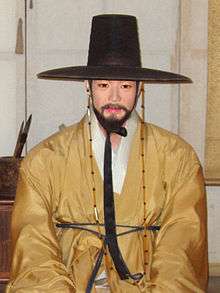갓
Korean
Etymology 1

Man wearing a gat.
First attested in the Hunmin jeongeum haerye (訓民正音解例 / 훈민정음해례), 1446, as Middle Korean 갇 (Yale: kat).
Pronunciation
- IPA(key)[ka̠t̚]
- Phonetic Hangul[갇]
|
Derived terms
- 갓모자 (ganmoja)
- 갓칠대 (gatchildae)
- 갓양태 (gadyangtae)
- 갓끈 (gatkkeun)
- 갓걸이 (gatgeori)
- 갓방 (gatbang)
- 삿갓 (satgat)
- 갓두루마기하다 (gatdurumagihada)
Etymology 2
First attested in the Dongui bogam (東醫寶鑑 / 동의보감), 1613, as Middle Korean 갓 (Yale: kas).
Possibly related to Old Chinese 芥 (OC *kreːds).
Derived terms
- 갓김치 (gatgimchi, “kimchi made of mustard leaves”)
- 갓나물 (gannamul, “mustard greens”)
Synonyms
- 입자 (ipja)
Etymology 3
Of native Korean origin.
Pronunciation
- IPA(key)[ka̠ːt̚]
- Phonetic Hangul[갇:]
|
Derived terms
- 나뭇갓 (namutgat)
- 말림갓 (mallimgat)
Etymology 4
Of native Korean origin.
Counter
갓 • (gat)
Etymology 5
First attested in the Seokbo sangjeol (釋譜詳節 / 석보상절), 1447, as Middle Korean ᄀᆞᆺ (Yale: kos).
Adverb
갓 • (gat)
Derived terms
- 갓밝이 (gatbalgi, “dawn”)
Etymology 6
Korean reading of various Chinese characters.
References
- Martin, Samuel E.; Yang Ha Lee; Sung-Un Chang (1975) A Korean-English Dictionary, New Haven: Yale University Press, pages 57-58.
This article is issued from
Wiktionary.
The text is licensed under Creative
Commons - Attribution - Sharealike.
Additional terms may apply for the media files.